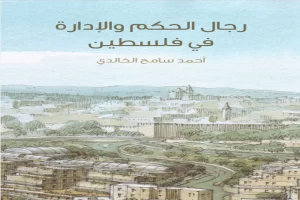Newly released
This book is new and will be uploaded as soon as it becomes available to us and if we secure the necessary publishing rights.

رجال الحكم والإدارة في فلسطين: من عهد الخلفاء الراشدين إلى القرن الرابع عشر الهجري Book PDF
(0)
Author:
Ahmed Sameh Al-KhalidiNumber Of Reads:
187
Language:
Arabic
Category:
HistorySection:
Pages:
82
Quality:
good
Views:
1326
Quate
Review
Save
Share
Book Description
Ahmed Sameh Al-Khalidi
Ahmed Sameh Al-Khalidi: He is considered the father of modern education in Palestine, and one of the great Arab educators in the modern era. where he devoted his life to building an educated nation; Believing that science is the basis for the progress and construction of nations, and in his last years he was interested in helping Palestinian refugees in Lebanon, and taking care of the affairs of their children's education. Ahmed Sameh Al-Haj Ragheb Noman Sheikh Ragheb Muhammad Ali Al-Sayyid Ali Muhammad Khalil Muhammad Sanalla Al-Khalidi was born in Jerusalem in 1896 AD, and received a distinguished degree of education; He completed his basic education at the American Colony School, and secondary at the English School, then traveled to Istanbul and joined the Medical University, where he graduated in 1916; He was appointed head of pharmacists in Homs. He was not satisfied with this, but his passion for education prompted him to study; He joined the American University of Beirut and obtained a Bachelor of Science and a professor's degree in Education, then a Master's degree in Education. Al-Khalidi served in the Ottoman army in the First World War, and with the fall of Palestine under the Mandate, he returned to his homeland and left pharmacy, and devoted his life to education; In 1919, he was appointed “inspector” of knowledge in Jaffa and Gaza, then was promoted as “inspector general” in the Department of Education in Jerusalem in 1923. He was also chosen as the director of the Teachers' House, which was called the Arab College in 1925 AD, and he held the position of Assistant Director of General Education in Palestine in 1941 AD, and Chairman of the Higher Education Committee in Palestine, and he obtained membership in the Royal Society of Arts, and The Royal Society of Central Asia” in Britain. Al-Khalidi was interested in the sons of the martyrs, so he founded the “Arab Orphan” project, the “General Arab Orphan Committee” and the “Sons of the Martyrs Institute.” After the 1948 A.D. catastrophe, he moved to Beirut and continued his interest in education. Al-Khalidi has several books in various fields of knowledge; In the field of education, he authored "Classroom Management" and "Teaching Pillars", and in the field of history he wrote "Egyptian Institutes in Beit Al-Maqdis" and "Journeys in Diyar Al-Sham", and he also made a number of manuscripts. He died of a heart attack in Beirut in 1951 AD, but the traces he left continued to speak of his work despite his heart stopping.
Book Currently Unavailable
This book is currently unavailable for publication. We obtained it under a Creative Commons license, but the author or publisher has not granted permission to publish it.
Rate Now
5 Stars
4 Stars
3 Stars
2 Stars
1 Stars
رجال الحكم والإدارة في فلسطين: من عهد الخلفاء الراشدين إلى القرن الرابع عشر الهجري Quotes
Top Rated
Latest
Quate
Be the first to leave a quote and earn 10 points
instead of 3
Comments
Be the first to leave a comment and earn 5 points
instead of 3